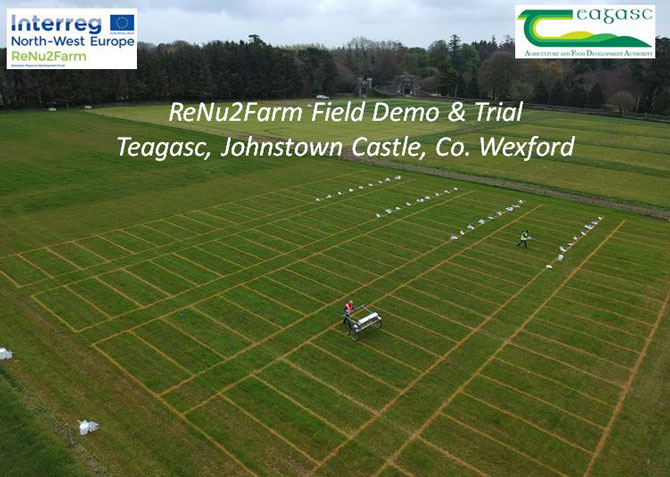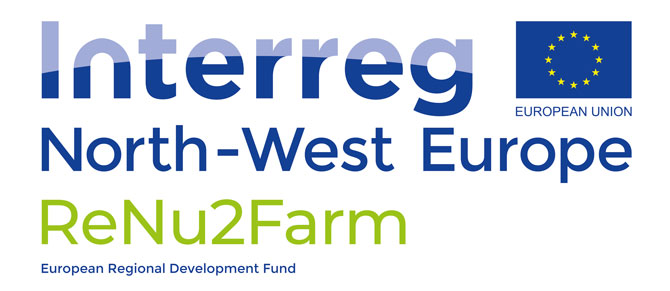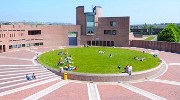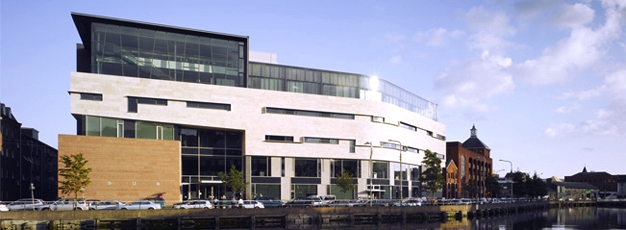CIT and the ReNu2Farm team invites you to Teagasc DairyBEEF2019 Open Day

Published on: Monday, 13 May 2019
The ReNu2Farm team, which includes Irish partners UL, IT Carlow, CIT and Teagasc, would like to invite you to Teagasc DairyBEEF2019 open day on the 21st of May in Johnstown Castle (Wexford).
ReNu2Farm is a major North-West Interreg funded collaboration comprising 10 partners from higher education organisations, research institutes and industry that will work to address the global threat posed to industrial agriculture by the vast depletion of the essential macronutrients nitrogen, phosphorus, and potassium (N, P, K), without which plants cannot survive. The ReNu2Farm project aims to increase recycling rates of these plant nutrients.
Currently, agricultural regions in the North-West of Europe are facing the challenge of soil nutrient sustainability for successful and environmentally friendly food security and farming. Some of the nutrients which farmers add to their fields via conventional chemical fertilisers are indeed N, P, and K. While nitrogen can be synthesised, it requires an enormous amount of fossil energy. Phosphorus and potassium cannot be made and are found and mined in significant amounts only in a few large deposits scattered across the planet which are now depleting.

A potential solution to the problem is to utilise NPK from waste materials but, despite the development of recovery technologies, the use of recycling-derived fertiliser (RDF) products to date has been minimal.
As part of the Teagasc DairyBEEF2019 open day, Irish partners including Dr. Achim Schmalenberger from UL in collaboration with Dr. Patrick Forrestal of Teagasc Johnstown Castle will demonstrate their grassland field trial. The team will showcase how phosphorus fertilisers made from rock phosphate that is mined outside Europe can be replaced. ReNu2Farm is using recycling-derived phosphorus fertilisers manufactured in North-West Europe and made from wastewater and poultry litter to produce phosphorus rich ashes and struvites. Scientists, farmers, agronomic advisers and the wider public are invited to experience our recycling-derived fertilisers and the field trial first hand at the Teagasc DairyBEEF open day (21st of May, Johnstown Castle).
ReNu2Farm is a joint collaboration. CIT's role under the lead of Dr. Niamh Power is to undertake stakeholder engagement through farmer surveys to identify the needs of farmers in terms of fertiliser properties and their willingness to accept recycling derived fertilisers from various sources. The team in CIT will also undertake mapping of the nutrient demand on a regional level to determine the overall demand of NPK.
IT Carlow, led by Dr. Thomaé Kakouli-Duarte, contributes in the project by carrying out the assessment of the ecological impact of the recycling derived fertilisers by analysing nematode, bacterial and fungal communities in the project field trials, as well as carrying out ecotoxicological analyses on the fertilisers in controlled bioassay single nematode species experiments and in microcosms. In addition, they will study the RDF products to exclude potential human pathogen and antibiotic resistance gene presence in them.
The team at UL will investigate how soil microbes can contribute to plant phosphorus supply and how this is affected by the use of recycling-derived fertiliser products in comparison to conventional phosphate fertiliser. As part of the Teagasc DairyBEEF2019 open day, Dr. Achim Schmalenberger from UL in collaboration with Dr. Patrick Forrestal of Teagasc Johnstown Castle will demonstrate their grassland field trial.
Dr Niamh Power of the Department of Civil Structural & Environmental Engineering in CIT said that “the ReNuFarm project is an excellent opportunity to put the farming community at the centre of this research, as manifested by the IFA being an Associate Partner in the project. The project aims at increasing recycling rates of the plant nutrients Nitrogen, Phosphorus and Potassium from three of the largest waste stream, sewage sludge, food waste, and manure. The wiliness of the farming community to accept recycled derived fertilisers (compost, digestate etc.) is crucial to the use of these products. Therefore, we invite farmers and the farming community to attend the open day to see these fertilisers for themselves. This research will build on research undertaken in CIT in sustainable waste management under the Sustainable Infrastructure Research and Innovation Group.”
More information is available at #dairybeef, #ReNu2Farm and http://www.nweurope.eu/renu2farm.









